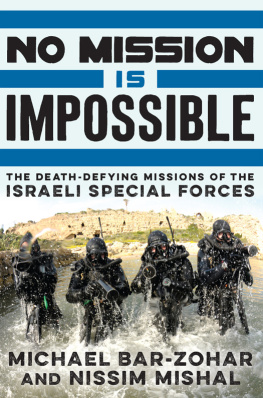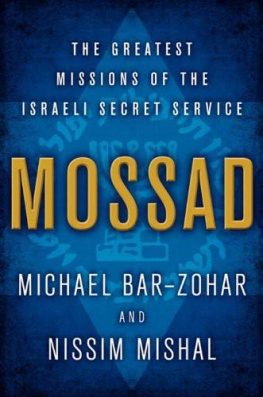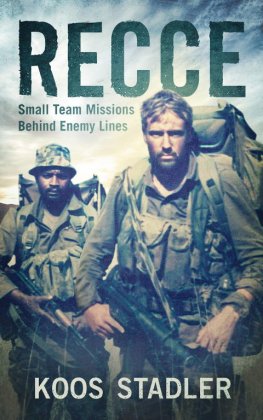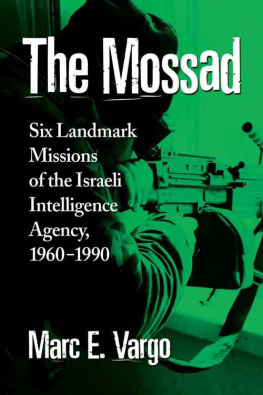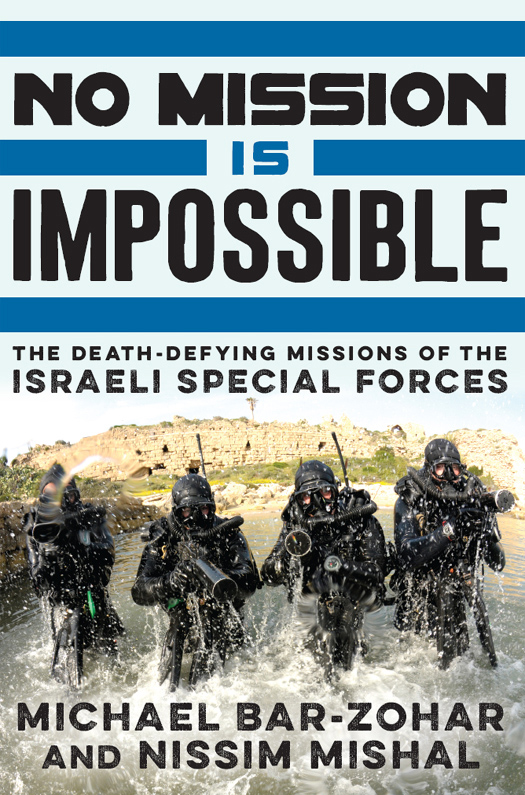For my comrades who fought at my side
The living and the dead
Conquerors of Sinai in the Six Days
Bravehearts across the Suez in Yom Kippur
Defenders of the North in Peace for Galilee,
Carrying the dream of peace in their hearts.
Michael Bar-Zohar
For my grandchildren
Idan, Yoav, Or, Guri, Noam and Noa
I am praying that youll see, one day,
The dove of peace with an olive branch.
Nissim Mishal
CONTENTS
Guide
S ince Israels Independence War, its army has been involved in two never-ending combats. A combat on the front lines with Israels enemies, who never give in, and an inner combatthe effort to conceive and apply strict moral and humane principles, unequaled by any other army.
The combat with Israels enemies has been and will remain uneven. In 1948, the year the Jewish State was created, its population numbered 650,000 people, who had to face an invasion by five Arab nations numbering more than 30 million. In 2015, when the Israeli population had risen to 8 million, made up of 80 percent Jews and 20 percent Israeli Arabs who dont serve in the army, the population of the states surrounding it had reached 140 million, and the gap continues to grow. Egypt and Jordan, who have signed peace treaties with Israel, should be taken out of this equation, but a new, redoubtable power has joined the enemy camp: the 75 millionstrong Iran, whose fanatic Islamist leaders have sworn to wipe Israel off the map, with conventional or unconventional weapons.
The IDF (Israel Defense Forces), therefore, has had to develop military techniques to compensate for the alarming gap between it and the Arab armies. This has been accomplished by equipping the army with the most modern and sophisticated weapons, many of them conceived and produced in Israel; by basing its war strategy on containment of the enemy on two fronts while concentrating the main effort on a third; by building a formidable air force and excellent intelligence services; and, especially, by forming several units of special forces, composed of deeply motivated volunteers, centered on physical and mental excellence, rigorous training, and, most of all, inspired by creative, inventive planning to surprise the enemy and to hit them at the most unexpected and vulnerable points, allowing a small number of soldierssometimes just a fewto carry out a mission normally requiring companies and battalions. This is how Unit 101, the paratroopers; the special commandos such as Sayeret Matkal, Shayetet 13, Kingfisher, Duvdevan, Shimshon, Maglan; the commando units in every IDF brigade; and others were created. The experience and the tactics of these select units would later be shared with the main bodies of the army. We could not resist you, a captured Egyptian general admitted after the Six Day War. You are an army of commandos!
T he battle for moral conduct in times of peace or war is based on an ethical code originating in the Haganah underground, which operated before Israel was even created. The concept of purity of arms was forged by the Haganah, meaning that combatants weapons shouldnt be soiled by hurting civilians, women, children or unarmed enemy soldiers. Several trials of IDF soldiers, in the past and present, have been based on that commandment. A famous court ruling speaks of a black flag flowing over any military order that counters the law; the soldiers should oppose it rather than execute it. This concept is enforced by the IDF, and any infractions, including some during the last confrontation with the Palestinians in Gaza, are brought before the courts.
As it tries to protect enemy noncombatants, the IDF strives to protect its own. A principle conceived under fire in the Independence War was never to abandon a wounded or stranded soldier in enemy territory but to rescue him at all costs. Rescuing endangered Jews and Israelis abroad has also become a major commandment, be they terrorist hostages, as in Entebbe (1976), or a community at risk, as the Ethiopian Jews in 1981 to 1991.
Another distinctive term is Follow me! The officers in the combat units should not only instruct and train their men and women; they should always be the first to engage the enemy, charging ahead of their soldiers, giving them a personal example of courage and devotion. Follow me! has become the battle cry of the Israeli Army and explains the large proportion of officers among IDF war casualties.
T he moral values, the strong motivation, the special training, and the unorthodox strategy of the Israel Defense Forces have come together to produce a soldier for whom no mission is impossible.
On October 6, 1973, on Yom Kippur (the Jewish Day of Atonement), Syria and Egypt launched a surprise attack on Israel, simultaneously invading the Golan Heights in the north and the Sinai Peninsula in the south. After several painful losses, Israel defeated her enemies, but at a heavy cost. Three years after the Yom Kippur War, Israel is still licking her wounds, having lost 2,700 soldiers and much of her deterrent protective power. Golda Meir has resigned as prime minister and been replaced by Yitzhak Rabin; Moshe Dayan has been replaced by Shimon Peres as defense minister. Rabin and Peres distrust and dislike each other, but they have to work together to deal with the unending attacks of terrorist groups on Israel.
A German couple boarded an Air France plane in Athens on June 27, 1976, quietly took their seats in first class and placed their bulky carry-on bags beneath the seats in front of them. The man was of slight build, his brown hair and beard framing an oval face, a mustache drooping over a pointed chin and blue beady eyes. Apparently tired, he leaned back in his seat and closed his eyes. His companion, wearing a summer pantsuit, was a tall, blond woman with a pretty face, slightly marred by a prominent jaw.
The Airbus A300 Flight 139 from Tel Aviv to Paris, with a short stopover in Athens, carried 246 passengers105 of them Jewish and Israeliand twelve crew members. During the Athens stopover, more people boarded. The passengers from Tel Aviv cast indifferent eyes on two Middle Easternlooking men in dark suits who were shown to their economy-class seats by a smiling blond hostess.
At 12:35 P.M., fifteen minutes after the aircraft took off from Athens, the two Germans opened their handbags. The man took out a large gaily painted candy box and removed its tin cover. The woman produced a champagne bottle and started spinning it in her hands. Suddenly the man drew a miniature submachine gun out of the candy box and leapt to his feet. He darted to the cockpit and pointed his weapon at the pilots. At the same time, the woman unscrewed the bottom of the champagne bottle and pulled out a handgun and two grenades.
Hands up! she yelled at the first-class passengers. Dont move from your seats!
Similar shouts could be heard in Economy, where the two Middle Eastern men had jumped from their seats, brandished small submachine guns, and easily subdued the other passengers. The excited voice of the male German hijacker boomed from the loudspeakers. He announced in accented English that he was the new captain of the aircraft and identified himself as Basil Kubaissi, commander of the Che Guevara Commando of the Gaza Strip,, belonging to the Popular Front for the Liberation of Palestine.
Panic swept the passenger compartmentsshouts of fear and anger, and weeping, erupted from almost every seat. The horrified passengers realized that they had been hijacked and were the prisoners of terrorists. The new captain and his companions ordered the passengers to throw all weapons in their possession down in the aisles. Some set down pocket knives. Immediately afterward the hijackers submitted the male passengers to thorough body searches. And meanwhile the plane turned and headed south.

